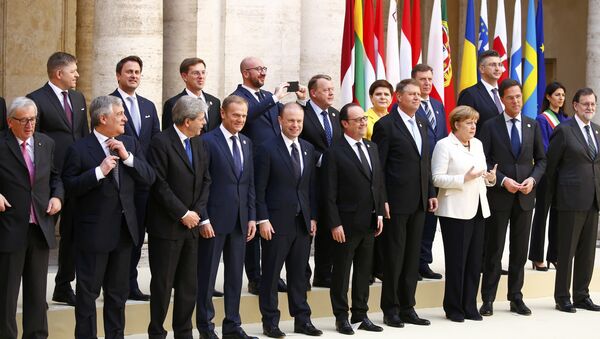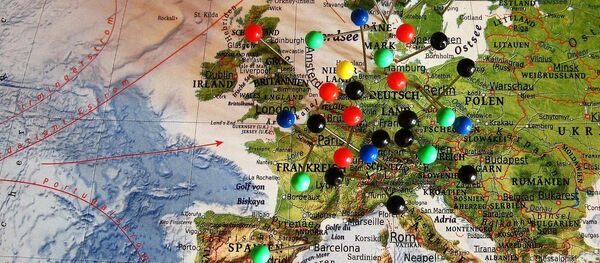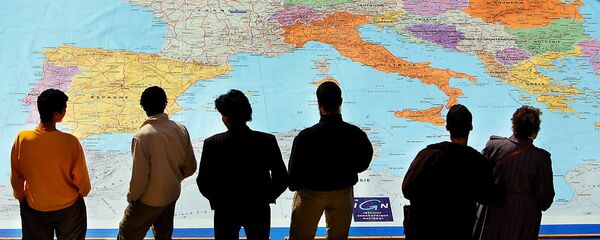Despite optimistic remarks by European Commission President Jean-Claude Juncker about the future of the EU, German Chancellor Angela Merkel, for her part, admitted in an interview with the Italian news network Rai that the EU "did not do everything well" in its migration and economic policy and that some relevant issues have yet to be resolved.
Theresa May's absence from summit in Rome reflected the EU's division and sense of pessimism https://t.co/WyOFbEcTjn pic.twitter.com/JMfSDIfTJZ
— Bloomberg Brexit (@Brexit) 26 марта 2017 г.
She was echoed by European Council head Donald Tusk and European Parliament President Antonio Tajani, who called the EU an "ineffective and extremely bureaucratic" organization.
"We are not tired of Europe, but we want it to work better," he said, referring to the EU.
In an interview with the Russian online newspaper Vzglyad, Russian political analyst Alexei Martynov said that the EU could be successful when being supervised by the US, but the mistakes made by former US President Barack Obama created a lot of problems that immediately affected the well-being of Europe.
As for the just-adopted Rome Declaration, "it contains no clear answers to the challenges or ways to resolve urgent problems," according to Martynov.
The EU has never been more divided than it is now, we must make sure it crumbles so Europe can recover https://t.co/ksAiNaZuz4
— David Jones (@DavidJo52951945) 25 марта 2017 г.
"A number of global adventures by Barack Obama and his administration have finally led to the collapse of the US' European project. This process has been active for the last five years," he said, adding that Britain realized what had happened and decided to leave the EU.
He also pointed to the EU's problems pertaining to national security and the Schengen area, which Martynov said is currently "under serious threat."
"Most likely, Europeans will give it up under the pressure of migration problems and they will again build a lot of fences. The collapse of the Schengen Agreement will be the first step towards the collapse of the entire EU, because the EU philosophy is built around so-called openness. Any EU document or project always begins with the word 'open'," Martynov said.
It is safe to assume, therefore, that "there will be no EU in the same political form," he concluded.
Italian political analyst Raffaele Marchetti, for his part, told Sputnik Italy that "the lack of full integration related, for example, to the issue of the migration crisis, has become one of the EU's flops."
According to him, "a unified system for managing migration flows and the distribution of migrants was not developed" within the EU.
Marchetti also called for the creation of the so-called "two-speed Europe", which he said will help solve the problem of insufficient integration, "even if the division of countries into two speeds of development causes anger among those who will be ranked second speed countries."
"The EU's eastward expansion was a strategic choice for Germany, Britain and the United States, which wanted to expand the EU-NATO sphere of influence against Russia. In fact, it was this extension that caused the problems. Thus, the concept of a 'two-speed Europe' in some sense is designed to resolve the problems caused by the expansion," he said.
It also proposed the creation of a common market, a customs union and common policies, known as the common market.
Never miss a story again — sign up to our Telegram channel and we'll keep you up to speed!




